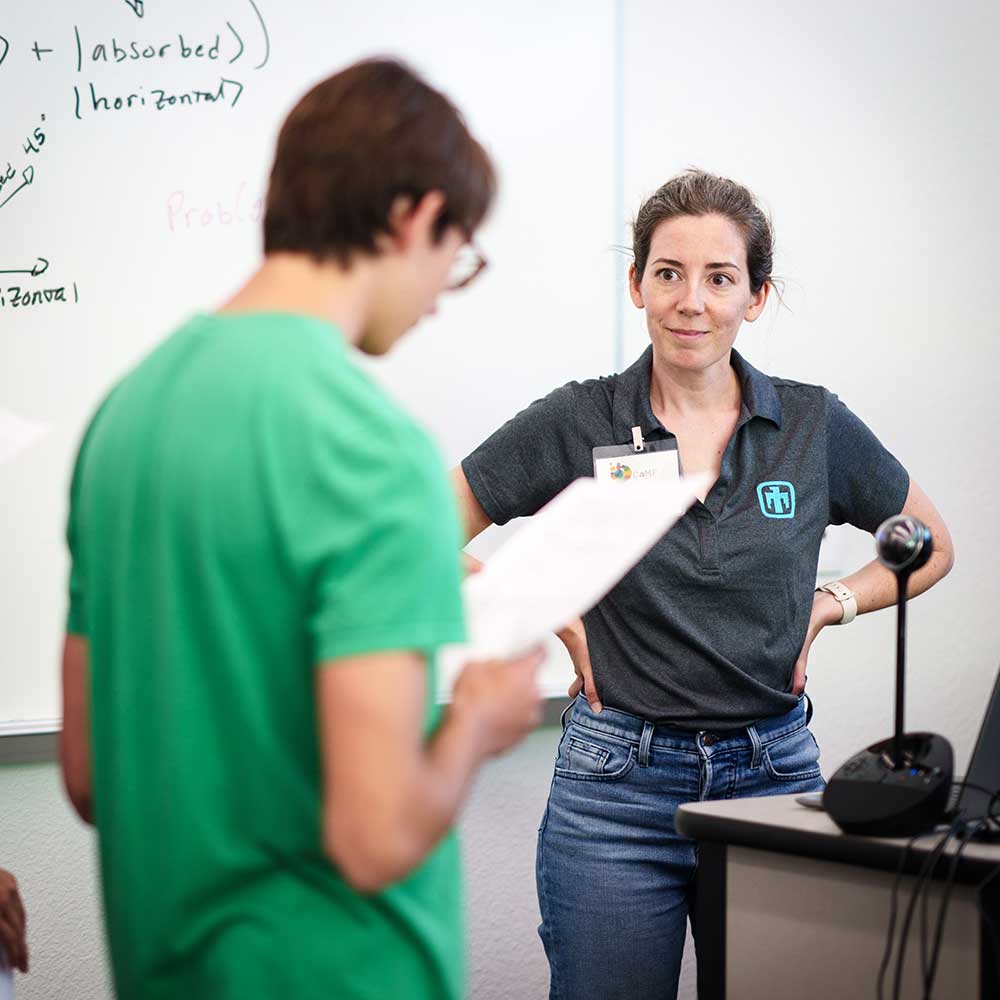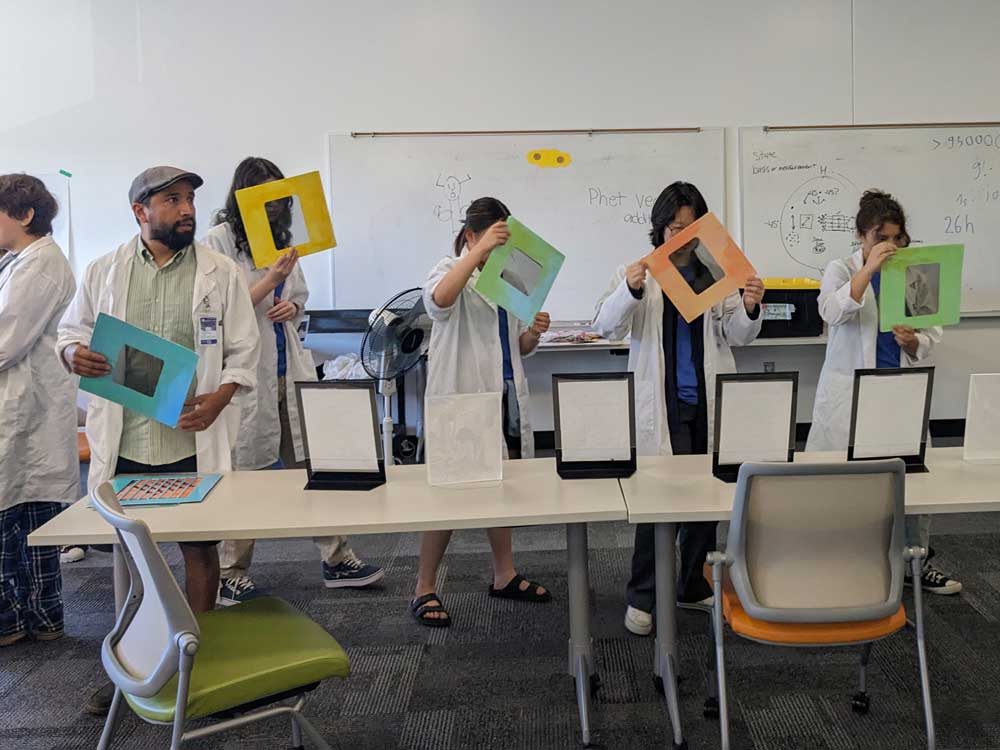One physicist’s journey from a small town to a STEM mentor

Megan Ivory grew up in the tiny town of Sidman, Pennsylvania, with a population of less than 600. It’s a town where the big news will always be what happened there 135 years ago: the Johnstown flood of 1889 that killed 2,000 people in a single day.
Megan said she was long told the stories of that tragic day, the dam break that triggered it and the engineering failure that caused it.
“You would think that it would have inspired generations to pursue engineering degrees, but most people I grew up with, including me, thought engineers drove trains.”
So, Megan found inspiration elsewhere.
She spent her childhood exploring the arts, thanks to the influence of her mother, a seamstress for local theater productions. “I remember sitting in the back of the auditorium during dress rehearsals captivated by the ‘big kids’ on stage. As soon as I was old enough, I was auditioning for every show I could find.”
But science was never far from reach, thanks to her dad, a high school chemistry teacher. “He would do fun science projects with my sister and me, like bring home dry ice, or bring home owl pellets so we could dissect them and reconstruct the skeletons of consumed rodents, or go out and explore nature, build forts and catch tadpoles and praying mantises,” Megan said.
Little did she know, she would one day become an experimental atomic Ph.D. physicist at Sandia, teaching quantum science to high schoolers.
Finding her way
Megan said she was always good at math but found it incredibly boring and abstract. She only decided to study physics in college because it offered a bigger financial aid package, and that’s something she depended on. Megan said she stumbled on quantum science after graduation when she went to work for a professor in a quantum physics lab.
“I fell in love with the challenge and complexity of building experiments for producing ultracold atoms for things like atomic clocks and quantum sensors,” Megan said.
That love quickly ballooned into a passion and led Megan to Sandia where she started as a postdoc to work on atomic clocks. Today, Megan is a staff member researching quantum computing with trapped ions with the goal of doing cutting edge quantum research and sharing her knowledge with young people.
Inspiring young people
Megan does that in part through QCaMP, a summer science camp that she co-founded with fellow Sandian Jake Douglass in 2022.

QCaMP, which stands for Quantum, Computing, Mathematics and Physics, is a hands-on way for high schoolers to learn the basics of quantum science and help teachers explore the best way to incorporate it into their classrooms.
It intertwines Megan’s love of science and the arts.
“Those who know me outside of work might guess that my energetic teaching style is due to my theatrical background,” Megan said.
Her work recently earned her the Air Force Research Laboratory’s New Mexico Excellence in STEM Mentor of the Year award.
The awards, known as STEMYs, were created in 2018 to honor New Mexicans doing great things in STEM education. The Mentor of the Year Award honors people who inspire the next generation of scientists by fostering a love of STEM in New Mexico kids through meaningful interaction.
“I am shocked and humbled,” Megan said. “I work with teachers who are in classrooms every day of their lives, mentoring students for their entire careers, so I am incredibly honored, spending only summers operating these camps, that I would still be considered for a mentor award.”
One of Megan’s nominators wrote, “Through Megan’s various efforts to introduce quantum to new communities, she has built, from scratch, curricula that explain some of the hardest physics concepts out there in a way that is relatable and digestible. The program she built was one of the first in the entire country, and her efforts have led to new camps with other innovators across the U.S.”
Building diversity
Why does Megan work so hard to teach her craft?
“To be honest, it’s largely selfish,” Megan said. “I am tired of being the only woman in the room in so many meetings and conferences. It’s a very male-dominated field. I think diversity brings something to the table in science with different backgrounds, experiences and creativities. I want more of that in my life.”
Megan hopes that will come with the next generation. Her work has helped QCaMP grow from a virtual-only camp in 2022 to a four-week camp for students and a three-day camp for teachers. To date, QCaMP has taught 115 teachers and 84 students, with plans to reach another 44 students during this year’s camp throughout July.
Each participant is paid a stipend to attend, so they don’t have to choose between a summer job and learning about science — something Megan feels passionate about because of her humble roots.
Megan attributes much of QCaMP’s success to her co-founder, who was born and raised in Roswell, New Mexico.
“I know how hard it can be to get exposure to science in rural areas,” Jake said. “I credit my love for science to my creative and passionate STEM teachers growing up. I am really excited to have this New Mexico-focused initiative that can teach local students about science and jobs and opportunities right here in our state, especially here at the Labs.”
Megan said it’s all about teaching kids what’s out in this big world of ours and yet, at the same time, how tiny it can be.
“We are not trying to create masters of quantum science but make them aware and excited about these careers,” she said. “If you don’t know what they are, it’s hard to make choices in life and get on a path. I am so excited that we are starting right here in New Mexico.”